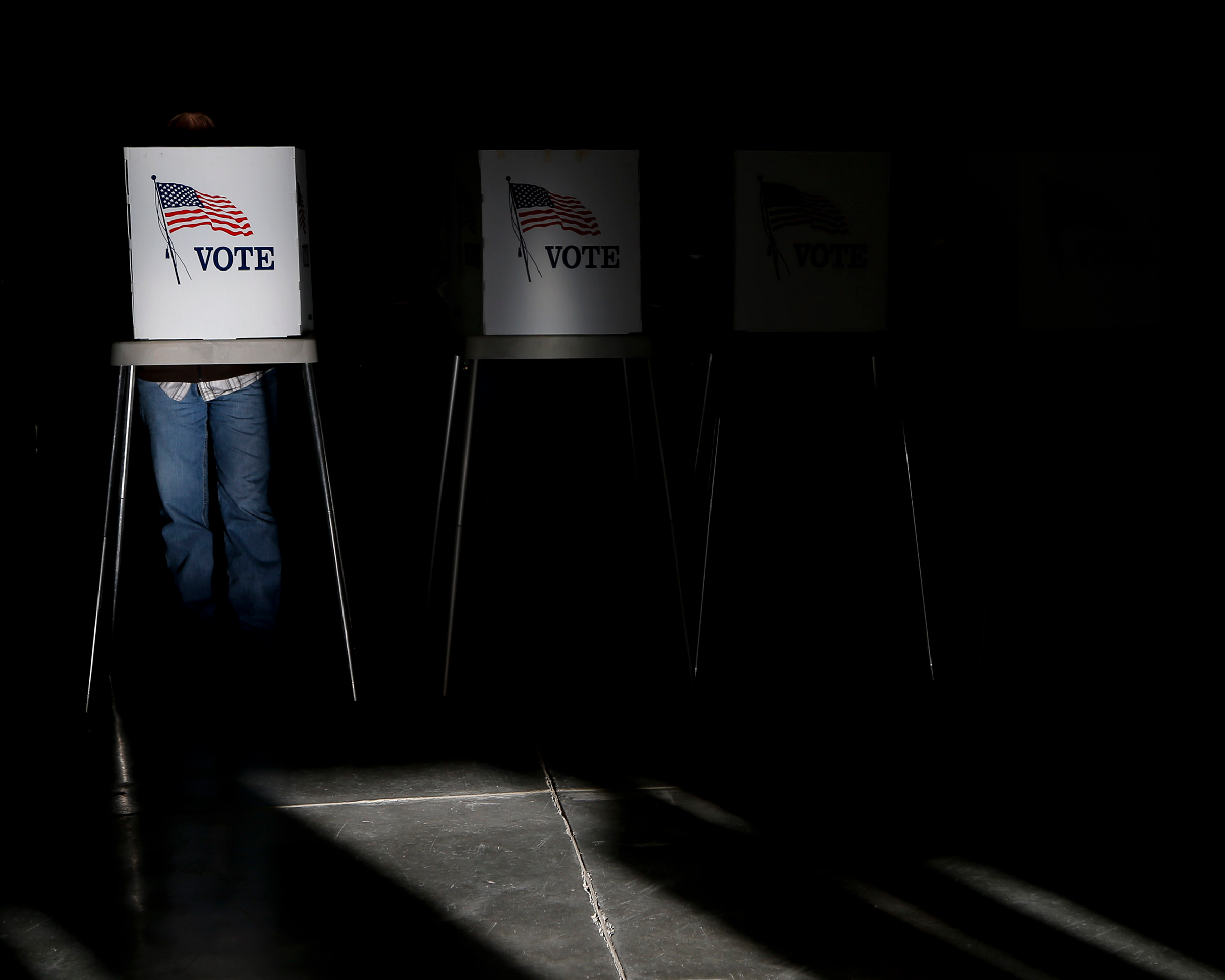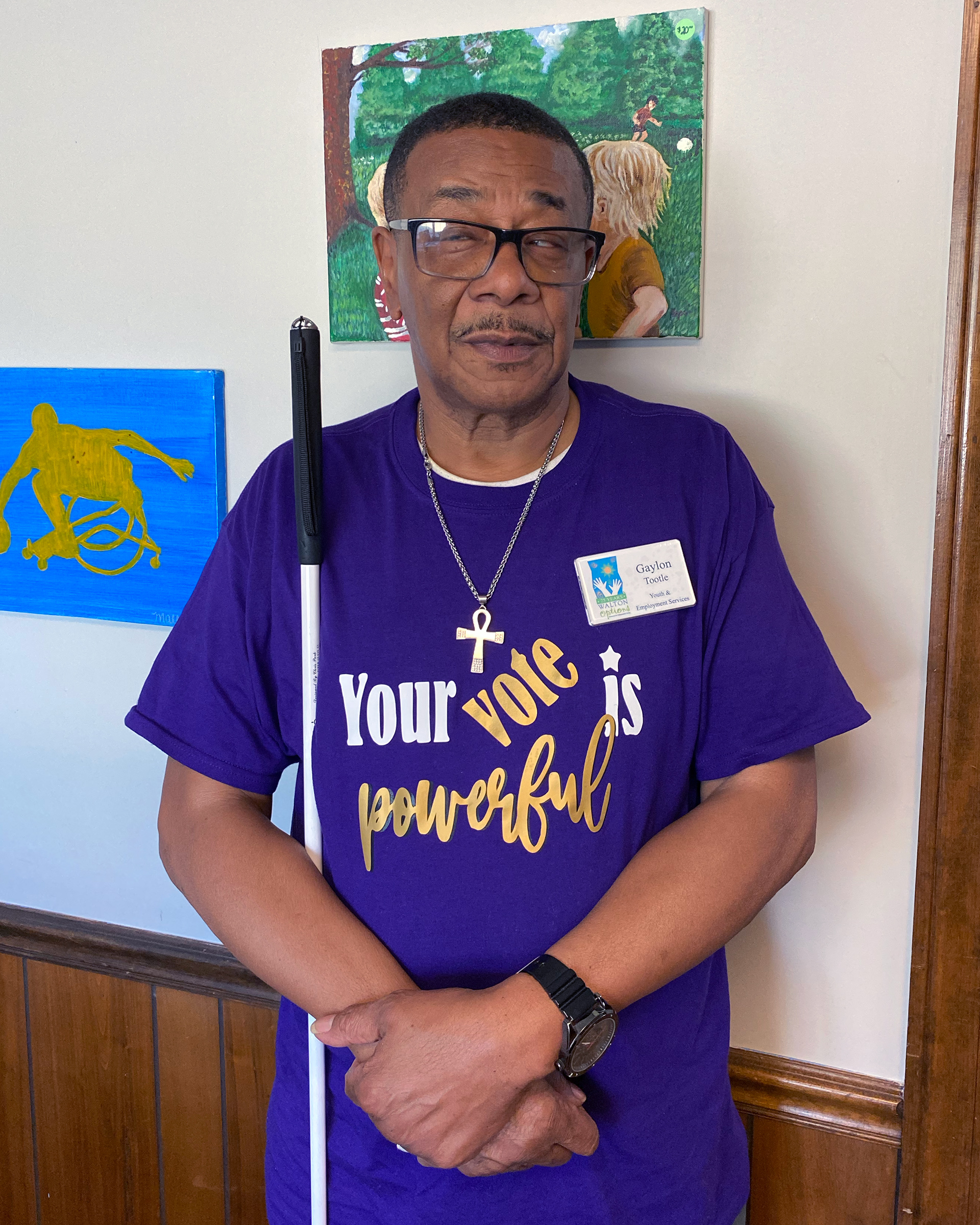
Gaylon Tootle, a Black and blind disability advocate in Augusta, Ga., has been fighting to make it easier for people in his state to vote for years.
Georgia’s electoral system posited challenges for disabled voters even before the state enacted a sweeping overhaul of its election law on March 25, becoming among the first of hundreds of restrictive voting measures introduced in state legislatures across the country this year to be signed into law. During the 2020 presidential election, Tootle struggled to fill out his own absentee ballot. “Hell, I couldn’t do nothing with it,” Tootle says. His wife had to help him out.
That’s in part why Tootle—who spends his days working as an independent living advocacy coordinator at nonprofit Walton Options, which serves thousands of disabled residents across 16 counties in the state—has been working nonstop, like many in Georgia, to evaluate the implications of the law and ensure disabled voters can still exercise their right to vote. More than a quarter of adults in Georgia have a disability, according to the U.S. Centers for Disease Control and Prevention. The new law, which Republicans allege will restore trust in the electoral system, contains close to a dozen restrictions. Disability activists have criticized the law’s motivations for being misguided given there was no widespread fraud in recent elections and said its restrictions are ableist because it will present additional barriers for disabled voters.
“As a Black and blind voter here in Georgia, I’ve already had issues with the system,” Tootle tells TIME from his office at Walton Options where he spends most of his time on the phone helping disabled Georgians navigate through all sorts of accessibility challenges, from housing to employment. “This stuff is in your face. It’s mean spirited, there’s no concern: how will it impact my people?”
The Georgia chapter of ADAPT—a national advocacy group for disabled Americans—said in a statement: “We all strongly condemn this new law as Jim Crow 2.0 which suppresses all voters because it is ableist, racist, colonialist, and deplorable.” Maria Town, president and CEO of the American Association of People with Disabilities said in a statement that she took issue with the new law “increas(ing) requirements for identification that people with disabilities are less likely to have, and restrict(ing) the use of ballot boxes.” She urged Congress to pass federal legislation, like the John Lewis Voting Rights Advancement Act, to preserve and expand voting access nationwide. “Disability and voting rights advocates have worked for decades to undo racist and ableist voting policies that limit access to the polls,” Town said. “Senate Bill 202 in Georgia is a direct reaction to the record turnout in the 2020 election, particularly among Black disabled voters.”

Tootle and other disability advocates are also concerned about restrictions related to out-of-precinct ballots and volunteers providing food and water to voters.
Voters can no longer cast a valid provisional ballot if they are at the wrong precinct—but right county—before 5 p.m. under the new law. It’s a rule that could especially pose an obstacle for disabled voters who may be confused about where to vote. It’s not always obvious which precinct to vote at given the possibility for last-minute changes to polling sites. Now, provisional votes cast after 5 p.m. will only count if a voter signs a statement saying they could not arrive at their designated precinct before the voting period ends at 7 p.m. “You’re not taking into account that I may have…a cognitive disability or learning disability, which sometimes causes me to simply make mistakes,” Tootle says. “You’re going to have some Black and brown folk that go in there, simply made a mistake and their vote will be automatically cancelled.”
Drop boxes are now also subject to strict limitations, although this is the first time they are codified into Georgia’s state law since each county will be required to have at least one. (They were previously a temporary measure used during the last elections because of the pandemic.) Voting rights advocates say the restrictions severely undercut their very purpose because they will be limited to one per 100,000 active voters or one dropbox per early voting location, whichever figure is lower. They can only be accessed during business hours. And they must be housed inside in-person early voting facilities, unless the governor has declared a state of emergency.
Tootle says that this is yet another measure that will limit access not only for disabled voters but also working-class ones, as it’s not always easy to cast a vote during the workday. He says many disabled Georgians rely on support networks to get around and that drop boxes offered a convenient way for them to deposit their ballot on their own schedule.
There’s also the measure that sparked a national outcry, including from President Joe Biden: the new “line warming” requirement, which bans non-poll workers from offering food or water to those standing in line within 150 feet of a polling place or within 25 feet of any voter standing in line. Supporters of the measure say the rule is intended to prevent any kind of electioneering close to the polling place. But critics say it’s just a cruel attempt to make it harder to vote. “It’s important that folks be able to sustain themselves,” Tootle says, especially in Georgia’s summers, when lines can get long and the temperature soars beyond 90 degrees.
Although the final law still contains several voting restrictions, lawmakers did back off from more aggressive proposals to curtail weekend voting and end no-excuse absentee voting. Tootle acknowledges that those changes helped preserve some accessibility, but maintains that they weren’t enough. “I’m not moved by that. Because again, that came from pressure from the outside—you didn’t do that because you had a certain change of heart,” Tootle says. “When we look at the total scope, and the way in which all of this stuff was done, you don’t get no kudos for me for that.”
One image from the last few weeks stands out in Tootle’s mind: Governor Brian Kemp signing the election measure into law under a painting of a plantation where Black people were once enslaved. “At the end of the day, you take a picture with a plantation over your shoulder and you got five old white men in there,” Tootle says.
Disability advocates in multiple other states have sued over the inaccessibility of vote-by-mail, arguing that more accessible electronic options should be available for blind voters—like they already are for some military and overseas voters. “As a blind voter, I should be able to…cast my vote independently, without help,” he says. (However, elections administrators and cybersecurity experts have warned that any voting process that relies on the Internet may be vulnerable to security threats.)
And it’s not just voting that feels inaccessible for Tootle, but the legislative process, too. Earlier this year, Tootle contacted lawmakers organizing public hearings for similar voting bills, which were often announced on short notice, but did not hear back about a way he could testify via Zoom. His concern about a lack of accessibility was one echoed by advocates and members throughout the legislative session. Some voting rights advocates did still end up testifying in-person.
“Right now, I may sound a little discouraged. I’m not discouraged. I’m angry. And I’m spending my time trying to figure out the best ways to advocate against the law,” Tootle says. The “real victory,” he explains, is to “run these guys out of town” and to “take them to court.” Civil rights groups have already filed at least five lawsuits over the new law, some of which allege a disparate impact on Black and AAPI voters.
For Tootle, the stakes on the ground in Georgia are clear. “If no one is here to tell our story, we’re gonna get swallowed up in this,” he says. “We’re gonna wake up one morning, and there’ll be (many more) states with the same stuff if we don’t address it right here.”
More Must-Reads from TIME
- Cybersecurity Experts Are Sounding the Alarm on DOGE
- Meet the 2025 Women of the Year
- The Harsh Truth About Disability Inclusion
- Why Do More Young Adults Have Cancer?
- Colman Domingo Leads With Radical Love
- How to Get Better at Doing Things Alone
- Michelle Zauner Stares Down the Darkness
Write to Sanya Mansoor at sanya.mansoor@time.com